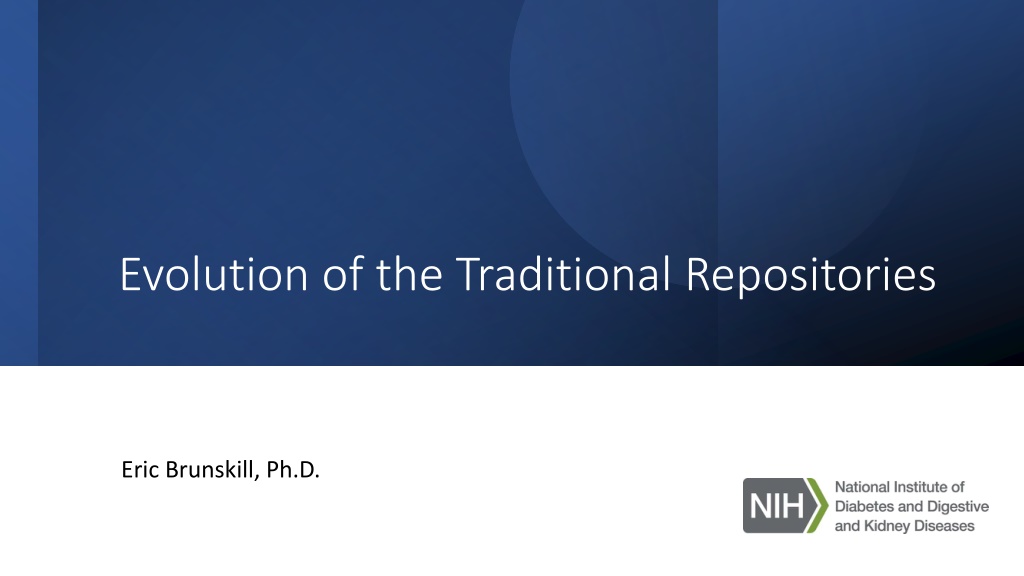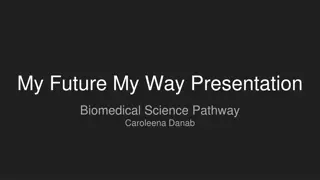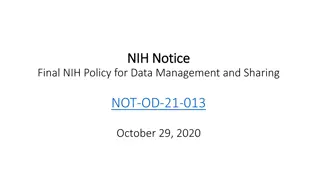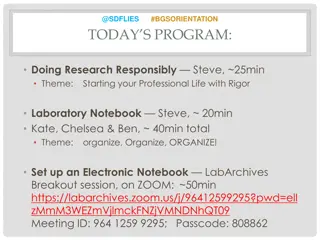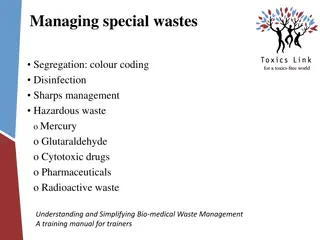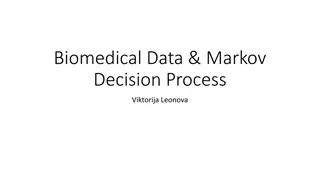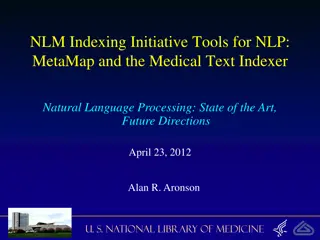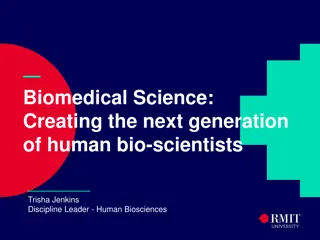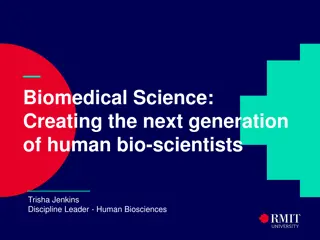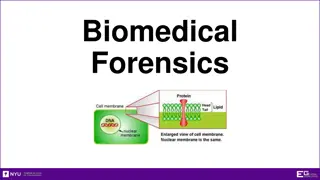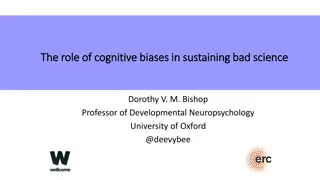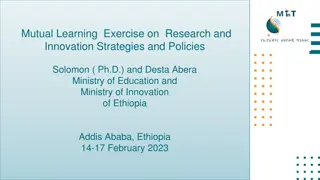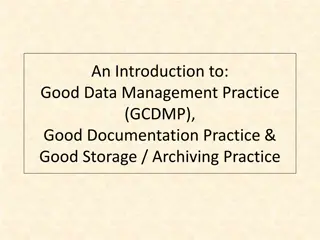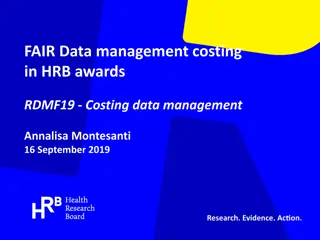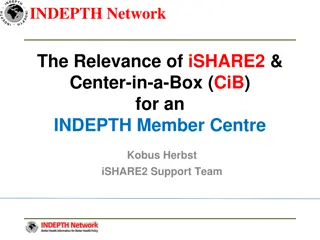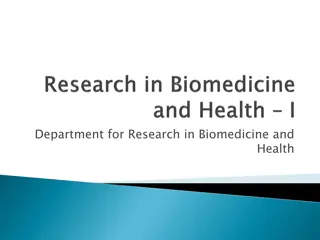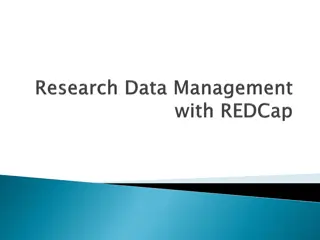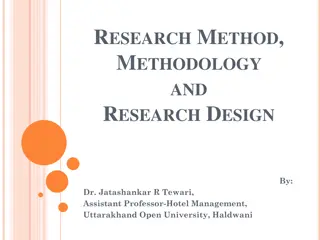Challenges and Opportunities in Data Management for Biomedical Research
Managing data in biomedical research repositories poses challenges such as data heterogeneity, quality issues, privacy concerns, standardization, and technical infrastructure requirements. Addressing these challenges through technology like data integration platforms, machine learning, cloud computing, and blockchain can enhance data management efficiency and effectiveness for researchers.
Download Presentation

Please find below an Image/Link to download the presentation.
The content on the website is provided AS IS for your information and personal use only. It may not be sold, licensed, or shared on other websites without obtaining consent from the author. Download presentation by click this link. If you encounter any issues during the download, it is possible that the publisher has removed the file from their server.
E N D
Presentation Transcript
Evolution of the Traditional Repositories Eric Brunskill, Ph.D.
NIH/NIDDK: DATA STEWARDS A HUMAN KIDNEY DISEASE ATLAS AND DATA REPOSITORY: KIDNEY PRECISION MEDICINE PROJECT The GenitoUrinary Development Molecular Anatomy Project (GUDMAP) provides data and tools that facilitate research on the GenitoUrinary (GU) tract for the scientific and medical community. https://www.gudmap.org/ (Re)Building a Kidney consortium coordinating research to generate or repair nephrons that can function within the kidney. is an NIDDK-funded https://www.rebuildingakidney.org/ atlas.kpmp.org
NIH/NIDDK Data Challenges: 1. Heterogeneity of Data: NIH repositories often house data from diverse sources and studies, including genomic, clinical, imaging, and behavioral data. Integrating these disparate datasets can be challenging due to differences in data formats, standards, and data collection methods. 2. Data Quality and Consistency: Ensuring the quality and consistency of data across different collections is crucial for meaningful secondary research. Variations in data quality, missing data (Data sparsity), and inconsistencies in data coding can hinder integration efforts. 3. Data Privacy and Security: NIH repositories typically contain sensitive and personally identifiable information. Balancing the need for data sharing with strict data privacy and security requirements can be complex. Ensuring compliance with regulations like HIPAA (Health Insurance Portability and Accountability Act) is a significant challenge. 4. Data Standardization: NIH repositories may contain data in different formats and standards. Harmonizing data to a common standard can be time-consuming and resource- intensive. 6. Metadata Standardization: understanding and using the data effectively. Standardizing metadata across different collections is essential for discoverability and interoperability. 7. Technical Infrastructure: Integrating and managing large and diverse datasets requires robust technical infrastructure and data management systems. Ensuring compatibility and scalability of these systems can be challenging. 8. Data Access and Permissions: Establishing access policies and procedures that balance the need for open access with the protection of sensitive information can be a complex task. 9. Ethical Considerations: Ensuring that data integration respects ethical principles, such as informed consent and data sharing agreements, is crucial in biomedical research. Ensuring that machine learning does not incorporate bias. 10. Funding and Resources: Developing and maintaining the infrastructure required for integrating and managing diverse collections can be costly. As datasets become larger and more complex, so do associated storage costs. 11. User Training and Support: Researchers may need to be educated on how to access, use, and analyze integrated datasets effectively. Providing training and support services can be resource-intensive. Democratization of data and analysis! Metadata is critical for
NIH/NIDDK: OPPORTUNITIES TO ADDRESS DATA CHALLENGES THROUGH TECHNOLOGY 1. Data Integration Platforms: Advanced data integration platforms, including data lakes and data warehouses, can help consolidate diverse datasets into a unified repository. 2. Machine Learning and AI: Machine learning algorithms and artificial intelligence can transformation, and harmonization. processing (NLP) techniques can be employed to standardize metadata and extract valuable information from unstructured data sources. 3. Cloud Computing: Cloud computing services provide scalable and cost-effective infrastructure processing, and analysis. Cloud-based platforms like AWS, Azure, and Google Cloud offer tools and services for data storage, integration and analytics. 4. Blockchain and Data Provenance: Blockchain technology can enhance data security and traceability, ensuring that data is tamper-proof and that its origins and modifications are transparent. This is particularly important for maintaining data integrity in multi-institutional collaborations. 5. Data Standards and Ontologies: standardized data formats, biomedical ontologies helps ensure data consistency and interoperability. 6. APIs and Web Services: Application Programming Interfaces (APIs) and web services provide a standardized way for different systems to interact and exchange data. They can facilitate the integration of data from multiple sources into a unified platform. 7. Data Visualization and Exploration Tools: Interactive data visualization tools can help researchers explore and analyze integrated datasets effectively. HuBMAP Vitesse/KPMP Explorer. 8. Open Science Platforms: Open science platforms and research data repositories promote data sharing and collaboration. They often come equipped with tools for data integration, metadata management, and version control. 9. Collaborative Research Ecosystems: research ecosystems that bioinformaticians, and domain experts can help address both technical and governance challenges. Cross-disciplinary teams can work together to integrate and analyze data effectively. 10. Data Linkage and Federated Databases: Federated databases and distributed data linkage techniques allow data to remain in its original location while enabling seamless querying and analysis across different datasets. assist in data mapping, language Natural for data storage, Building collaborative scientists, involve data The adoption schemas, of and metadata
